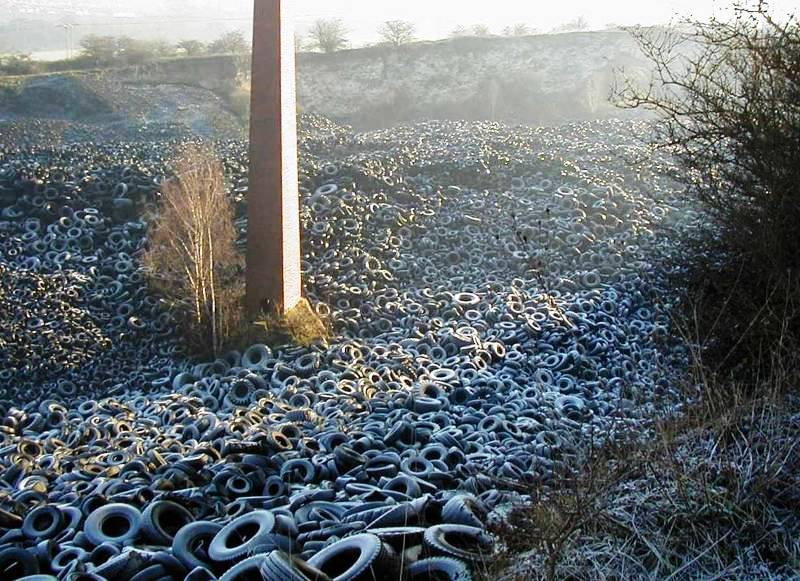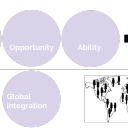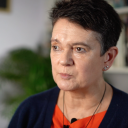Welcome to the Anthropocene

Hundreds of fly-tipped tyres in a disused chalk quarry in Kent. Photo: Wikimedia Commons.
All states, markets, welfare systems, major religions, their justifying ideas and the people that fought to create them came about in a uniquely stable epoch geologists call the Holocene. This era was typified by a climate suited to human flourishing, and is now over. In its place comes the Anthropocene, the name for a time in which humans are the decisive influence on the natural world.
This influence is so overwhelmingly negative that younger and future generations may inherit unassailably high levels of damage. Currently, we consume resources at around 1.5 times the Earth’s ability to regenerate them – a rate which, crucially, differs enormously between countries. Extinction rates are now some 1,000 times the background rate and around 58% of all vertebral life may have died between 1970 and 2012. This precipitous collapse in global biodiversity means we are likely to be living through the sixth major mass extinction of multicellular life on Earth.
Species loss is being made worse by changes to the very systems that facilitate life. The most famous of these is the carbon cycle and 2016 is likely to be the point at which atmospheric CO2 concentrations permanently exceeded 400 parts per million. It is estimated that a 66% chance of avoiding a 1.5C rise in the global mean temperature – a red line identified by the UN – will require all global carbon emissions to cease around Easter 2021. Another cycle is the global nitrogen cycle, which has, in the last 40 years, been impacted more than at any point in its 2.7 billion year history. These changes are the result of a global food system that has destroyed a third of all arable land over the same period. Global top soil degradation means we may only have sixty harvests left.
Together, the effects of resource depletion, collapsing biodiversity, rising temperatures and the instability of the earth’s regulating systems feed into each other creating dangerous feedback loops. In turn, these increase the chance of tipping points such as the rapid melting of Siberian tundra below which methane, a potent greenhouse gas, is trapped. Runaway climate change could then occur, bringing other systems with it. A vicious circle.
The destabilisation of natural systems is already feeding back into human systems. Take phosphorous, which we can’t synthesise, is essential to the global food system, and is being consumed at an unsustainable rate. These pressures came to a head in the wake of the financial crisis when phosphorous prices spiked by 800%. In turn, food prices shot up, affecting those countries with disproportionate reliance on food imports, including the Middle East and North Africa. The effects then fed into the causes of civil unrest that led to the Arab Spring and the Syrian civil war. This instability displaced around 12 million people from the Fertile Crescent, some of whom fled to Europe. The resultant ‘migrant crisis’ widened political and cultural fault lines that opened up in the wake of the financial crisis.
In fact, these fault lines have been opening up over the last thirty years as a result of wage stagnation, rising inequality, recurrent economic crisis, industrial decline and the retreat of the state at a time of increasing globalisation. A cursory glance at past episodes of globalisation teaches us that government needs to support those who are negatively affected, and that ‘too much market, too little state’ leads to a backlash. The prevailing approach to economics and politics – so called ‘neoliberalism’ – demands the precise opposite. Combine this with the perception of a corrupt and uncaring elite and the agenda of vested interests within and out of the media, and surprise at the election of Donald Trump and the result of the EU referendum seems inappropriate.
And so, after considering the scale of the failure of the current approach to capitalism, what happens when the collapse of natural systems begins to kick in? Even if Marine Le Pen doesn’t become French president, what happens to Europe if profound social collapse in the Middle East, a by-product of resource depletion and spiralling food costs, led 120 million people to be displaced? In this world, global co-operation could give way to domestic protection, leading to a breakdown of co-ordination as countries turn inward, or on each other. This is what global collapse looks like.
We are not there yet. But understanding of the scale of these threats is poorly understood, partly because they are so complex. It’s also because there is little to no awareness of these issues within and out of the political process. Many people would have noticed Black Friday was last week. Did they notice that temperatures in the Arctic are around 20C above what is expected for this time of the year and that the Winter sea ice is now at the lowest extent ever recorded? Our political systems at least ostensibly rely on aware voters applying pressure to politicians, who are in turn supported by an ecosystem of researchers and civil servants. If one, or both, of these groups is unaware of the scale of the challenge it may be impossible to rise to it.
There is a particularly acute generational element to this. Like a young doctor walking into the ER for a night shift and inheriting a total disaster from a clueless older colleague, the millennial generation must first comprehend the scale of the problem. Quickly realising that the odds are not in its favour, this generation must receive all the help it can get in creating institutions fit for the Anthropocene, and the ideas to underpin them. Surely these must include global programmes of technological development as well as the reigning in of vested interests that prevent action on, or understanding of, systemic instability. They will also likely have to include preparation for the worst, including triaging action to support nature and human societies, the implications of which pose profound questions of equity beyond the staggering inequalities already imposed by human systems and environmental degradation. By definition these institutions cannot be neoliberal and so we must understand how democratic institutions can exist in a radically unstable world and how they will ultimately differ from authoritarian technocracies, however liberal in their intention.
As such, having inherited damage of almost incomprehensible scale and complexity, the millennial generation may be the most important on earth. It could be that this challenge brings together a vast number of diverging constituencies across generations in a transformative political agenda – a re-politicisation of all that neoliberalism has ostensibly de-politicised. Indeed, anything other than this may be unacceptable. But it may be that we are in dire straits. When considering the scale of change already underway in many economies – including automation and digitalisation, demographic change and economic stagnation – the acceleration of environmental instability could place societies under intolerable stress. It is unclear how our institutions will be able to cope with this challenge. In endeavouring to overcome it, all generations must first understand that there is a chance we are entering a period of potentially terminal crisis. Only then can we rise to the challenges of the Anthropocene.
This article is an unbridged version of an essay in Juncture, IPPR’s journal of politics and ideas.






